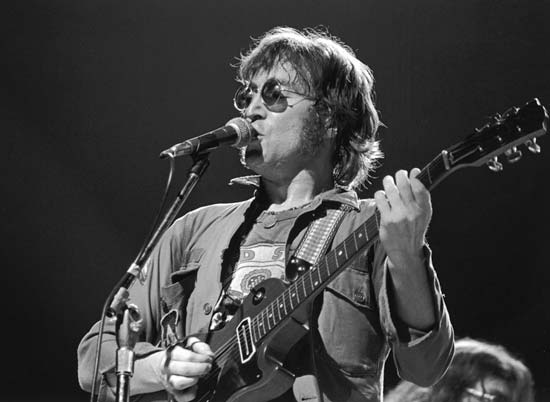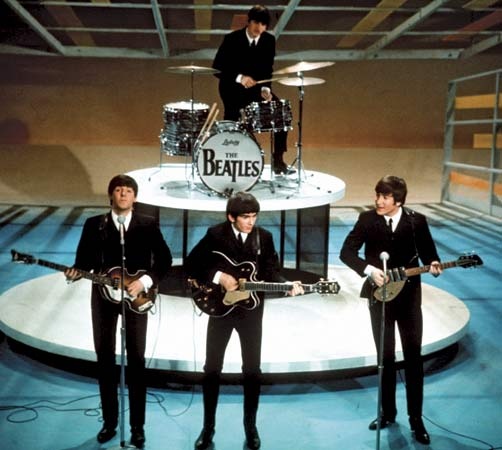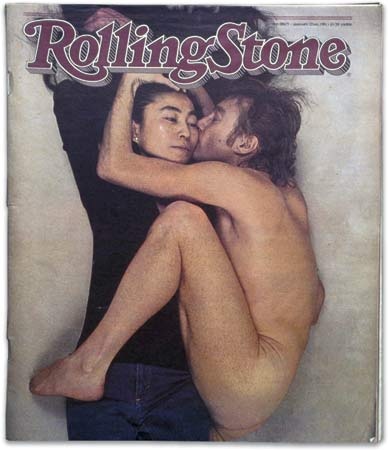Lennon, John
British musician
in full John Winston Ono Lennon
born Oct. 9, 1940, Liverpool, Eng.
died Dec. 8, 1980, New York, N.Y., U.S.
 leader or coleader of British rock group the Beatles (Beatles, the), author and graphic artist, solo recording artist, and collaborator with Yoko Ono on recordings and other art projects.
leader or coleader of British rock group the Beatles (Beatles, the), author and graphic artist, solo recording artist, and collaborator with Yoko Ono on recordings and other art projects.Lennon's fun-loving working-class parents married briefly and late and declined to raise their quick, sensitive, gifted son. Separated traumatically from each of them by age five, he was raised strictly (in Woolton, a Liverpool suburb) by his maternal aunt, Mimi Smith, whose husband died during Lennon's adolescence, as did his biological mother, who had taught him to play the banjo. Such circumstances were not uncommon in the wake of World War II, but in Lennon they generated anger that he sublimated with brilliance and difficulty and an intense need for human connection. At age 21 he married the supportive, traditional Cynthia Powell, whom he divorced in 1968. At age 28 he married the independent, unconventional Yoko Ono. And much earlier, at age 16, he founded a skiffle band that evolved into the Beatles, the most important musical group of the second half of the 20th century.
 The Beatles were essentially a joint venture between practical pop adept Paul McCartney (McCartney, Sir Paul) and alienated rock-and-roll rebel Lennon, but, as a disruptive cultural force, they always bore Lennon's stamp. Musically, just two of countless examples are the forthright candour his vocal added to Smokey Robinson (Robinson, Smokey, and the Miracles)'s vulnerable "You've Really Got a Hold on Me" in 1964 and the “I used to be cruel to my woman” bridge he added to McCartney's positive-thinking "Getting Better" in 1967. Culturally too, Lennon assumed the role of the candid provocateur. All four Beatles were witty, all four irreverent. But only Lennon would have observed “We're more popular than Jesus now” or boiled the story of youth culture down to “America had teenagers and everywhere else just had people.”
The Beatles were essentially a joint venture between practical pop adept Paul McCartney (McCartney, Sir Paul) and alienated rock-and-roll rebel Lennon, but, as a disruptive cultural force, they always bore Lennon's stamp. Musically, just two of countless examples are the forthright candour his vocal added to Smokey Robinson (Robinson, Smokey, and the Miracles)'s vulnerable "You've Really Got a Hold on Me" in 1964 and the “I used to be cruel to my woman” bridge he added to McCartney's positive-thinking "Getting Better" in 1967. Culturally too, Lennon assumed the role of the candid provocateur. All four Beatles were witty, all four irreverent. But only Lennon would have observed “We're more popular than Jesus now” or boiled the story of youth culture down to “America had teenagers and everywhere else just had people.”Lennon's genius encompassed writing and the visual arts, the only field in which he received formal training. His natural gifts in both were considerable, but in the end he proved a minor humorist and a casual if indelible cartoonist. In music, he had less inborn facility, though his paternal grandfather worked for years as a blackface minstrel. But music was where he put his substance. Lennon was one of the great rock rhythm guitarists, his signature a nervous rest-one-two-and-rest that complicated his foursquare attack, and his strong, nasal singing overshadowed McCartney's more physically capable rocking and crooning. Declarative where the rockabilly singers he admired were frantic, almost a blues shouter in spirit if not in timbre, Lennon often undercut the masculinity of this approach with a canny, playful high voice deployed to humorous and even campy effect.
Such layered, contradictory meanings typified the Beatles, part of whose power lay in the multiplicity and collectivity they projected. But as Lennon began to withdraw from the Beatles, a process accelerated as of 1968 by his relationship with Ono, his declarative side took over. This dovetailed with the artistic ideas of Ono, a well-born Japanese avant-gardist seven years his senior. Lennon was first fascinated and then influenced by her terse, sometimes paradoxical directives, such as: “Count all the words in the book instead of reading them” ( "Number Piece 1," from the book Grapefruit 【1964】). Much of the music Lennon recorded after 1968—from "Yer Blues" and "I'm So Tired" on The Beatles (1968) through the solo debut Plastic Ono Band (1970) through his half of Double Fantasy (1980)—reflects Ono's belief in art without artifice. Whether or not they actually eschewed artifice, that was one impression they strove to create.
Until Double Fantasy, most of the films and recordings Lennon created with Ono were of limited public usefulness. But the stark Plastic Ono Band is generally considered a masterpiece, and the more conventional Lennon album that followed, Imagine (1971), is a major work keynoted by its beloved title track, a hymn of hope whose concept he attributed to Ono. Like the earlier "Give Peace a Chance," "Imagine" is living proof of the political orientation that dominated Lennon's public life with Ono, which came to a head in 1972 with the failed agitprop album Some Time in New York City and the defeat of Democratic presidential candidate George McGovern (McGovern, George S) by incumbent Pres. Richard Nixon (Nixon, Richard M.), whose administration was attempting to deport Lennon, a vocal and adamant opponent of the Vietnam War.
 Lennon's most enduring political commitment was to feminism. When he and Ono separated in the fall of 1973, he spent a “lost weekend” of more than a year drinking and making highly uneven music in Los Angeles. When the couple reunited, they soon conceived a son, Sean, born on Lennon's birthday in 1975. Lennon retreated from music and became a reclusive househusband, leaving his business affairs to Ono. The details of this very private period are unclear, although it is unlikely that the couple's domestic arrangements were as idyllic as they pretended. Nevertheless, as a piece of art, their marriage projected as powerful an image as their activism had. It ended as fact when Lennon was shot to death by a deranged fan, Mark David Chapman, in front of his Manhattan apartment building on Dec. 8, 1980. But it continues as part of Lennon's legend, which remains undiminished.
Lennon's most enduring political commitment was to feminism. When he and Ono separated in the fall of 1973, he spent a “lost weekend” of more than a year drinking and making highly uneven music in Los Angeles. When the couple reunited, they soon conceived a son, Sean, born on Lennon's birthday in 1975. Lennon retreated from music and became a reclusive househusband, leaving his business affairs to Ono. The details of this very private period are unclear, although it is unlikely that the couple's domestic arrangements were as idyllic as they pretended. Nevertheless, as a piece of art, their marriage projected as powerful an image as their activism had. It ended as fact when Lennon was shot to death by a deranged fan, Mark David Chapman, in front of his Manhattan apartment building on Dec. 8, 1980. But it continues as part of Lennon's legend, which remains undiminished.Additional Reading
There is no biography of John Lennon that finds an intelligent, informed middle ground between hagiography and hatchet job. The best of the former is Ray Coleman, Lennon: The Definitive Biography (1992). The most fully researched of the latter, Albert Goldman, The Lives of John Lennon (1988, reissued 2001), is so transparently spiteful as to be almost useless. Jann S. Wenner, Lennon Remembers, new ed. (2001), the Rolling Stone interviews; and David Sheff, The Playboy Interviews with John Lennon and Yoko Ono, ed. by G. Barry Golson (1981, reissued as All We Are Saying: The Last Major Interview with John Lennon and Yoko Ono, 2000), are eloquent interviews. The Editors of Rolling Stone, The Ballad of John and Yoko, ed. by Jonathan Cott and Christine Doudna (1982); and Elizabeth Thomson and David Gutman (eds.), The Lennon Companion: Twenty-five Years of Comment (1987, reissued 2004), are useful collections. The best academic studies are Anthony Elliott, The Mourning of John Lennon (1999), written from a postmodernist perspective; and Jon Wiener, Come Together: John Lennon in His Time (1984, reprinted 1991), a political take.
- Civil Constitution of the Clergy
- civil defense
- civil disobedience
- civil engineering
- Civil Guard
- Civilian Conservation Corps
- Civilis, Gaius Julius
- Civilista
- Civilization
- civil law
- Civil List
- Civil Rights Act
- civil rights movement
- civil service
- civil union
- Civita Castellana
- Civitanova Marche
- civitas
- Civitavecchia
- Cixi
- Cixous, Hélène
- Cizhou kiln
- Cizin
- Ciénaga
- C.J. Koch